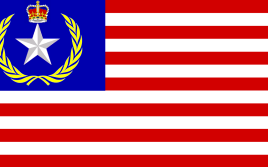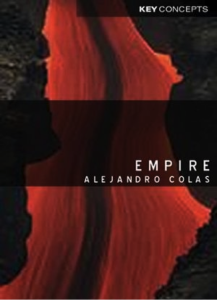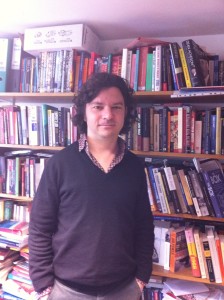Transcript
Living in a post 9/11 and post Iraq War world, we must inevitably ask what kind of power the U.S has as a global hegemon. In our latest podcast, Alex Colas joined Risa Arai in an interview about ‘empire’. Empire and imperialism have traditionally been associated with the big wave of expansion of states in Early Modern and Modern European history, but in this podcast we use the paradigm of ‘empire’ as a tool to look at current international relations. Are there still empires in the 21st century? How do these ideas influence relations between states? What are informal or indirect empires? Dr Alex Colas, a senior lecturer in International Relations at Birkbeck College, University of London, and author of the book, Empire, explains.
Alex Colas: The concept of empire comes from the Latin, Imperium, basically meaning ‘power’. So anything related to empire concerns questions of power between and across states.
I’d suggest that there are some trans-historical features of empire. They involve first, and most obviously, expansion. All empires expand beyond their regional political origins, they’re polities that are expansive.
Secondly, empires claim to, and often times do, deliver an order – international order, regional order sometimes, and when we get to the modern empires, a global order of sorts. This order is sustained by law and by certain civilisational norms, ranging from religion to language.
Thirdly and very importantly, empires claim to provide that order, and are constantly expanding, in a hierarchical form. So, they are very clear that they are the centre of the world, that there is a hierarchical relationship between the centre and periphery, and that the dominant populations of the centre are also the dominant populations of the periphery. They tend to have myths of origin that suggest a supremacy over all or, some kind of civilising mission, some kind of mandate of heaven (or elsewhere), to control and subordinate other peoples because of their superiority.
RA: Historically, we have been observing a number of empires. Especially in Europe, a lot of empires have emerged. How can we classify different empires?
AC: You can classify empires in all kinds of ways depending really on the emphasis you want to give to the different aspects i.e. the expansion, the order or the hierarchy that I have just mentioned.
One obvious way to do so is to contrast pre-modern empires to modern ones, merely a chronological classification. There is, occasionally, a spatial separation between Western and Eastern that sometimes follows the line of, say, sea-born empires versus land-based empires. But I personally think it is much more useful to look at those temporal and spatial contrasts through the old fashioned term, ‘mode of production’ – the way and in which those empires generate and distribute wealth. So I would make a distinction between, say, tributary empires and mercantile empires. Tributary empires those that are reliant on the extraction of taxation or revenues through tributes (be that in the forms of money or in human contributions to warfare or contributions to public infrastructure, or indeed through slavery which can be considered as a form of a tribute.) I would contrast those tributary empires to mercantilist empires which are more about buying cheap and selling dear, engaging in long-distance trade and monopolizing certain key trade routes around the world. Furthermore, I would contrast those two types of empires to properly capitalist empires such as Industrial Britain and, most notably, the United States of America – that are principally concerned with generating wealth and re-distributing it through markets, but they support that endeavour with global military, legal, and even cultural, means.
RA: Now, you just mentioned about the United States of America as an empire in 21st century global power. How is the U.S different from other empires?
AC: Yes, the United States is a post-colonial, and some might even argue anti-colonial, empire. And that presents a paradox, namely that you can think of power – I was saying earlier that empire means power – this is a global power. The United States has been a global power since at least the middle of the 20th century, when it entered World War II in 1941. And it has projected that power on the global reach. In many respects the borders of the United States do not stop at the Pacific coast or the Rio Grande or at the Atlantic coast, rather they extend to Vietnam and Korea, wherever there is some kind of military base or some kind of political interests of the United States of America. So it is a peculiar empire. I have called it an empire of open doors and closed frontiers – in so far, as it is an empire that promotes markets, capitalist markets in particular, but it does so through the entity of the nation state, through the sovereign state. So paradoxically, sometimes contradictorily, this is an empire that actually creates alternative, even competing, centres of power.
Take, for example, West Germany or Japan or indeed South Korea after 1945. Here we have an almost colonial presence, a pro-consular presence, of the United States if one thinks of the military presence in those countries. Then, there is the reshaping of their constitutions after 1945. And yet, after ‘the job was done’ of creating a constitutional liberal democracy, the United States stepped back, relatively speaking, allowing those societies to flourish economically so long as they did so within the bounds of the U.S.-led capitalist market. It seems to me that is a good example of what people like, Gallagher and Robinson call ‘indirect imperialism’, informal empire, where the actual military or political presence is formally equal. It’s not hierarchical in the way it might have been in the past. And yet very clearly the United States accrues the benefits. And many of its allies in those countries, particularly the elites, accrue the benefits of a U.S.-led global economic system.
RA: The US dispatches its military to its allied countries, like Japan or South Korea. Is it considered to be an expansion of the territory, and invasion or protection?
AC: Of course it depends who you speak to. But personally, analytically, it’s better to think in terms of a ‘protectorate’ in the case of Japan and West Germany and South Korea. We know, for example that the Japanese and West Germans were constitutionally emasculated in terms of the use of their military outside their territorial borders. That is one example of a trade-off. The United States basically said ‘you can fall under our umbrella, we will protect you from your immediate enemies – East Germany, the eastern bloc, in the case of West Germany; China and North Korea in the case of Japan. And in exchange for that protection, we will expect you to integrate fully into the mechanisms of the international system, most notably, the international economy, into the U.S.-led financial system and to adjust your laws and your ways of social organization to those of the United States. I think that, therefore, is a relationship, where once again, there is a formal equality amongst those different polities – one which incidentally can alternate or is not constantly hierarchical – and yet at the same time, structurally embedded in the kind of formal relationship, is the inequality of economic relationships and military diplomatic relationships.
RA: So, how are the most recent cases of American ‘invasion’ of Afghanistan or Iraq different from the situation in Japan, South Korea or West Germany?
AC: I think those are really good questions. And they are questions that have been asked within the United States as well as outside of the United States. How come this is an informal empire if it is a republic, not an empire. So many Americans say, why we are invading other states? This is something they had done right from the beginning, thought about why it is that this beacon of freedom should be invading and occupying other states. And I think the answer from my perspectives is that it is in the United States’ interest to build states. So in the case of Afghanistan and Iraq, in slightly different ways but nonetheless broadly following a similar strategy, I think the occupation was principally aimed at reconstructing some semblance of a legitimate territorial state. In many respects, Americans – whether they know it or not – are not at least the American planners are Weberians, they want the legitimate monopoly over the means of violence. Because only that kind of territorial entity which has a social infrastructure of education, of health, of a reliable working force, of a legal regime that is enforceable, property etc. Only that kind of entity can then facilitate the order which the United States benefits from and many of its allies benefit from – namely, a liberal international order. John Ikenberry, one of the prominent scholars on empire, suggest that the United States does not rule the world but it wants the world of rules. I think that the invasions and occupations of Afghanistan and Iraq, in however a paradoxical way, are aimed at least at constructing that world of rules through nation states. Clearly they’ve failed in that but I think the objective, the impetus, was strategically one of bolstering and shoring up state sovereignty.
RA: These days, this empire, the U.S.A, is fighting, in many cases, against non-state actors such as terrorists or pirates. This picture of state actor versus non-state actor was not nearly so significant before. So do you think this is changing the concept of ‘Empire’?
There are two responses to that. One is to emphasise that modern empires have always engaged with so-called non-state actors. In fact, the mercantilist empires that I was referring to before were, in many respects, public-private partnerships. The East India Company of the Netherlands or the East India Company in Britain, in England, were effectively private endeavours that were licensed by the state. And they indulge themselves in a great deal of what today we would call, mercenarism or piracy or privateering. So the first thing to say is that empires have historically involved themselves with these non-state actors, – today we might call them transnational criminal syndicates. And this is the case up to and including the 20th and indeed the 21st century. For example, when we look at the both Iraq and Afghanistan, again by design or default, the United States and its allies has relied very much on warlords – and they could be considered as executers of private violence. In another context, I have called that private violence.
My second response to your question about non-state actors is to look at the role of the networks. The United States perhaps faces or has faced more sophisticated networks. The classic example would be Al Qaeda. However, I think we have to be careful not to generalise or to fold a very diverse set of forms of resistance or contestation and shoehorn them into some kind of generic network form. Let’s not forget that even Al Qaeda has attached itself to very local disputes –in Kashmir, Southern Arabia or Yemen or indeed in Afghanistan. These are local disputes, with local dynamics that have been given the Al Qaeda franchise but in fact obey certain historical antagonisms that are imbued with often quite particular kinds of characteristics, be they a certain kind of ethnic antagonisms, or indeed, in the case of Afghanistan, just issuing from the end of the Cold War itself and after. So I would say that yes, the United States, in many respects is an empire that faces more sophisticated networks but these are often imbued with very state-centric dynamics.
RA: Talking about non-state actors: civil society recently exerted considerable energy in protesting against governments. In London we had the Occupy Movement, in the US there was ‘Occupy Wall Street’, and there were similar demonstrations across Europe. People were challenging capitalism. Does this movement or trend undermine the capitalism empire, the United States?
AC: I don’t think it does. I think these are very imaginative, very noble endeavours to occupy public spaces by way of demonstrating how far the neo-liberal phase of capitalism has gone into dispossessing public arenas and appropriating communal spaces in broader sense- both those that fall under the auspices of the state or those that are simple shared by a public. However, I am of the persuasion that you need some kind of state power to counter the extremely powerful mechanisms of the rule of the market. Without some degree of legislation, without some degree of material power invested in some kinds of public bodies, democratically endorsed of course, it is very difficult to curtail the power of markets. And to that extent, I think, that simple occupation does not in itself challenge the dynamics or the circuits of capitalism. It may bring to our attention this colonisation of the public sphere but it is at best a first stage in a much broader campaign to try and socialise all kinds of other private domains, including our workplaces and aspects of finance. At worst it could become merely a symbolic representation of the weakness of resistance against this pervasive colonisation of our lives by the market.
RA: And what about China – could China become a global empire, even replace the United States?
AC: Well, I think, the Chinese rise, the peaceful rise, is peculiar in at least two senses. One, it is regional. It is not a global ambition. This of course goes back to tradition from the last admiral that withdrew from overseas voyages Zheng He [note: modern spelling of his name] in the middle of 15th century. I think in that respect, China’s neighbours are clearly, including the Republic of China, Taiwan, are clearly very concerned about the investment for instance in naval capabilities of the People’s Republic. But this is a form of regional influence, sphere of influence that, I think, has very local repercussions. Of course, the Chinese – as we know – are investing in many other parts of the world through sovereign wealth funds and bilaterally in the case of Africa. But this comes in the shape, principally, of economic investment. It does not come with the rules and the cultural norms that have characterized most other global empires. I think the second thing that is distinctive about China as a regional power, or if you like as a global emerging power, is that its economic basis is extremely dependent on foreign investment. There is a little evidence of indigenous firms being the main conduits for some kind of the global supremacy. The Chinese economy is still very dependent on foreign direct investment. Indeed, the signal aspect of Chinese peaceful rise was its joining of the World Trade Organization, which I think, demonstrates that it’s still incorporating itself into, as Ikenberry would have it, a World of Rules. It is engaging in the rules of the game that have been set up by the United States and its allies. And to that extent, it’s a less hegemonic contender and has less global imperial ambitions, than it is an extremely powerful regional economy and very powerful regional diplomatic force.




Subscribe with…